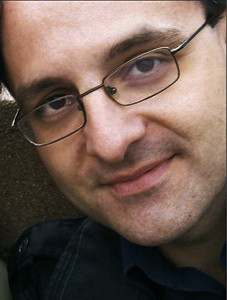
This course took place from April to May, 2014. It is now closed.
Brazil’s National Association of Newspapers (ANJ) and the Knight Center for Journalism in the Americas, with the support of Google, will offer the Massive Open Online Course (or MOOC) in Portuguese, “Introduction to Infographics and Data Visualization.” The four-week course will start on Apr. 14 and end on May 12. It will be taught by instructor Alberto Cairo, with the University of Miami, one of the world’s leading experts in the field.
Just like every other Knight Center MOOC, the course will be offered for free. Anyone in the world with access to the Internet is invited to participate. Click here to register.
Thanks to Google’s support, participants that are working journalists or journalism professors or students living in Brazil will be able to apply for a scholarship to participate next August in the 10th Brazilian Congress of Newspapers, organized by the ANJ in São Paulo. The ANJ will award the scholarship to the students with the eight best final projects and will cover travel and hotel expenses in São Paulo.
This will be the ninth MOOC offered by the Knight Center at the University of Texas in Austin since it launched in 2012 its pioneering massive courses program. The initiative has already benefited more than 33,000 persons in 150 countries.
This is the second online training course that the Knight Center organizes in association with the ANJ, and the second time the Knight Center receives Google’s support (the first time was during the successful MOOC in Spanish “Development of Journalistic Projects for the Web” in 2013).
“We are very happy to offer in Portuguese our most successful course, which has reached thousands of persons all over the world. In this age of abundant data, of big data, every journalist needs to learn at least the basic notions of data visualization,” said Professor Rosental Calmon Alves, director and founder of the Knight Center.
“We are proud to collaborate once again with the ANJ, work with Alberto Cairo and have Google’s generous support in bringing our Brazilian colleagues the opportunity to learn in Portuguese what thousands of other journalists have already learned in English during previous editions of this MOOC,” he said.
Ricardo Pedreira, ANJ’s executive director, also expressed his enthusiasm for the project.
“The success of the ANJ and Knight Center’s first joint activity showed us we’re on the right track, which is to continue promoting online activities that allow a larger number of professional journalists gain access to quality training. We’re confident this MOOC will be a success.”
“Introduction to Infographics and Data Visualization” will be taught once again by Alberto Cairo, a world-renowned specialist in the field who developed an original program to fit the massive format of the course.
“Our three MOOCs in English had an enormous success. I think this shows that journalists from all over the world feel a great need to improve their understanding of the techniques associated with transforming data and information into statistical graphs, maps and diagrams. Nowadays, communicating data in a journalistic fashion not only requires knowing how to write, but also being able to create visual elements that help readers see patterns and tendencies in the data,” Cairo said.
“Brazil has an interesting situation,” he added. “On the one hand, the country’s journalism schools (in general) have been very conservative in not teaching design or quantitative analysis techniques to their students. Journalists in Brazil generally are good reporters and good writers, but they don’t know about numbers, statistics or visual representations. On the other hand, I feel that a lot of traditional journalists across newsrooms are aware of this situation and are interested in learning, which is why I think our MOOC can help a lot.”

Cairo currently teaches at the University of Miami’s School of Communication and has taught several regular online courses on the Knight Center’s distance learning platform. Chapters of Cairo’s book, The Functional Art, are used in the course. He will also use his Twitter account @AlbertoCairo to complement class discussions.
Although “Introduction to Infographics and Data Visualization” will be free, participants who want to receive a certificate will need to pay online a $30 administrative fee via credit card. The certificate will be issued only to students who actively participated in the course and who complied with the course requirements, such as quizzes and exercises. The certificates will be available for downloading as PDF documents. No formal course credit of any kind is associated with the certificate.
The National Association of Newspapers brings together Brazil’s leading newspapers. The ANJ was created in 1979 to defend freedom of expression and thought and the press’ unrestrained operations within the principles of responsibility, as well as to fight for the defense of human rights, the values of representative democracy and free enterprise.
Google is a world-leading technology firm dedicated to improve the ways in which people connect with information. Google’s innovations in Internet search and advertising have made its website one of the main products online and its brand one of the most recognizable in the world.
The Knight Center for Journalism in the Americas was created in 2002 by Professor Rosental Alves, who holds the Knight Chair in Journalism and the UNESCO Chair in Communication at the University of Texas at Austin School of Journalism. In the past, the center was financed by major grants from the John S. and James L. Knight Foundation, as well from other donors, such as Open Society Foundations. Currently, the Center receives support from the University of Texas at Austin’s College of Communication and donations from the public.

Knight Center for Journalism in the Americas
300 West Dean Keeton
Room 3.212
Austin, TX, 78712
Phone: 512-471-1391
Email: journalismcourses@austin.utexas.edu